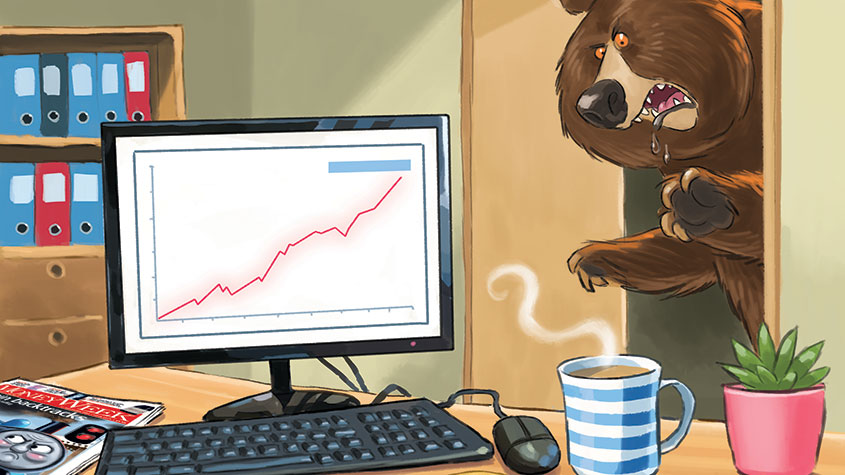Neil Woodford: no silver lining for his investors
Neil Woodford made every mistake it is possible to make as a money manager. And his investors have been stiffed. But however wrong it all went, Woodford never stopped taking the fees.

Get the latest financial news, insights and expert analysis from our award-winning MoneyWeek team, to help you understand what really matters when it comes to your finances.
You are now subscribed
Your newsletter sign-up was successful
Want to add more newsletters?

Twice daily
MoneyWeek
Get the latest financial news, insights and expert analysis from our award-winning MoneyWeek team, to help you understand what really matters when it comes to your finances.

Four times a week
Look After My Bills
Sign up to our free money-saving newsletter, filled with the latest news and expert advice to help you find the best tips and deals for managing your bills. Start saving today!

The most miserable story of the week has to be that of Neil Woodford. Again. It comes with a few amusing bits, of course. The excellent investigation into the saga in last weekend's Financial Times notes that Woodford spent so much time bouncing around on his expensive eventing horses that "the company brought in phones with special recording functions so he could make trading instructions while out riding".
But mostly there is nothing funny about the demise of Woodford's firm. Tell the story from scratch to someone not following it and it will sound unbelievable. Tens of thousands of people gave billions of pounds to a man to invest using a style he could produce no track record for in an environment he had no experience of.
That man made every mistake it is possible to make as a money manager. He changed style leaving value for overpriced healthcare and tech firms. He ignored criticism and compliance. He believed his own hype. He raised too much money. He held too many illiquid assets. He blamed the market every time something went wrong.
MoneyWeek
Subscribe to MoneyWeek today and get your first six magazine issues absolutely FREE

Sign up to Money Morning
Don't miss the latest investment and personal finances news, market analysis, plus money-saving tips with our free twice-daily newsletter
Don't miss the latest investment and personal finances news, market analysis, plus money-saving tips with our free twice-daily newsletter
And, of course, however wrong it all went, he never stopped taking the fees. Result? An awful lot of people have lost an awful lot of money. Woodford isn't one of them: he has received around £60m in dividends since 2014.
Will his clients get their money back? Some of it. It will take a good six months to wind the funds up. The costs will be high and the proceeds low (selling illiquid stocks into a market that knows you have absolutely no choice isn't a great look). Large losses are inevitable. Indeed, pretty much the only positive things I can say about the wind-up are, firstly, that the clarity it brings is good as is the scrutiny of the other players in the disaster and secondly that the instructions for its managers are unlikely to be yelled in from the back of a galloping horse.
However, there is one question I really want answered. Some of Woodford's £60m looks to have been spent on horses and houses. But how has he invested the rest? It would be nice to think it was locked up in the same maze of administrative hell as that of his investors. I suspect it isn't.
In these nervous times you will be looking for other things to be wary of. In this week's magazine, Dominic Frisby suggests you don't buy silver. There are endless good reasons to be bullish, he says. But believing them always leads to disappointment.
We aren't mad about Turkey either. It's cheap, but "for a very good reason". There's more misery in Matthew Lynn's City View column: the appointment of Christine Lagarde as the keeper of the euro may well hasten the end of it, says Matthew. Whose silly idea was it to hire a person who thought Argentina was good for a loan last year for such an important and tricky job?
For a little more optimism, Alex Rankine looks at the possibility of a burst of year-end euphoria in markets, and in our cover story this week, James McKeigue explains how to get in on the mining boom in Ecuador (this is about copper and gold more than silver!). Finally, after a pretty savage bear market, Max King thinks it is worth looking at retail property. Discounts are big and yields are high. But if retail is "changing not disappearing", there could be value there the kind of value the old Neil Woodford might have looked for.
Get the latest financial news, insights and expert analysis from our award-winning MoneyWeek team, to help you understand what really matters when it comes to your finances.

-
 Average UK house price reaches £300,000 for first time, Halifax says
Average UK house price reaches £300,000 for first time, Halifax saysWhile the average house price has topped £300k, regional disparities still remain, Halifax finds.
-
 Barings Emerging Europe trust bounces back from Russia woes
Barings Emerging Europe trust bounces back from Russia woesBarings Emerging Europe trust has added the Middle East and Africa to its mandate, delivering a strong recovery, says Max King
-
 What to do as the age of cheap money and overpriced equities ends
What to do as the age of cheap money and overpriced equities endsEditor's letter The age of cheap money, overpriced equities and negative interest rates is over. The great bond bull market is over. All this means you will be losing money, says Merryn Somerset Webb. What can you do to protect yourself?
-
 House prices to crash? Your house may still be making you money, but not for much longer
House prices to crash? Your house may still be making you money, but not for much longerOpinion If you’re relying on your property to fund your pension, you may have to think again. But, says Merryn Somerset Webb, if house prices start to fall there may be a silver lining.
-
 Investors are bullish – but be very careful
Investors are bullish – but be very carefulEditor's letter Many investors are buying the dip, convinced the latest upswing is the start of a new bull market. The odds are that it’s not, says Andrew Van Sickle. The bear has unfinished business.
-
The MoneyWeek approach to investing
Editor's letter At MoneyWeek, our aim is simple: to give you intelligent and enjoyable commentary on the most important financial stories, and tell you how to profit from them. So how do we do that?
-
 Prepare your portfolio for recession
Prepare your portfolio for recessionOpinion A recession is looking increasingly likely. Add in a bear market and soaring inflation, and things are going to get very complicated for investors, says Merryn Somerset Webb.
-
 Celebrity bitcoin ads echo the subprime mortgage crisis
Celebrity bitcoin ads echo the subprime mortgage crisisEditor's letter A wave of ads featuring celebrities punting crypto to the masses are reminiscent of how low income Americans were encouraged to take on loans they couldn’t afford, says Merryn Somerset Webb.
-
 Investing for income? Here are six investment trusts to buy now
Investing for income? Here are six investment trusts to buy nowOpinion For many savers and investors, income is getting hard to find. But it's not impossible to find, says Merryn Somerset Webb. Here, she picks six investment trusts that are currently yielding more than 4%.
-
 Will the UK's property slowdown turn into a house-price crash?
Will the UK's property slowdown turn into a house-price crash?Editor's letter As the cost-of-living crisis intensifies and interest rate rise, it is hard to see reasons for UK house prices to keep rising, says Merryn Somerset Webb.